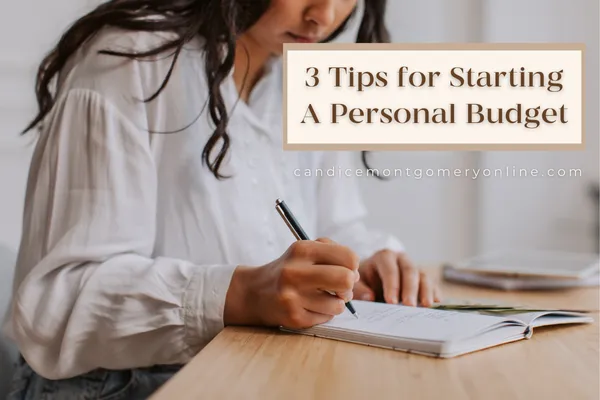
Three Tips for Starting A Personal Budget
Are you wondering how you are going to pay your bills? Has the thought crossed your mind if you have enough to DoorDash supper or if you need to eat at home? Or even the scary thought, if you will be able to have enough to make it to your next payday? Or are you making enough but you have no idea where your money is going each month? If any of these apply to you, than you need a budget!
Before I get any farther, a budget does not mean you are poor. It does not mean you are dumb or stupid. A famous person once said, "A budget is more than just a series of numbers on a page; it is an embodiment of our values.” Budgeting creates and gives you freedom!
If you are ready to start a budget, then keep reading! I have listed below the first three things to do when you are ready to start a personal budget! And if you have a business budget - I would encourage you to start with your personal budget and then transferring what you learn over to your business!
The first step in creating a personal budget is to know your numbers. In this step, you need to be brutally honest. Go to the bank (or pull up your bank account online) and print off your last two month bank statements.
Then grab four or more highlighters! Use a separate color highlighter for each category! Your categories are (your 4 walls food, utilities, shelter & transportation. then debt and other) income, bills, groceries, gas, eating out/fun, and debt! You may as well have a kid or school category if that is your current season! Adjust the categories to fit you!
After you have highlighted all of your bank statements - add up each category of how much you spent that month and then we are going to take the highest number! For example: in month one you spent $125 on gas and month two you spent $85 on gas - then for your gas category you will budget $125!
TIP:
You want to take the highest amount on expenses (money going out) and the lowest amount on income (money coming in). This is because you want to plan for your worst month (lowest income + highest bills and other expenses).
As well in this step, is to learn about your debt. Debt can be scary. But don't be embarrassed if you have debt. According to financial experts, 8 in 10 Americans have some form of consumer debt, and the average debt in America is $38,000 not including mortgage debt. You are not alone.
Pull up all your credit cards, personal, school, and family loans, etc and write down how much you owe. You then want to sort these debts from smallest to largest based on the balance!
For example: Chase Credit Card: $487, Apple Credit Card: $1080, Personal Loan $2,480 , School Loan $15,987 - these are sorted from smallest to largest balance.
TIP:
When paying back debt, pay smallest balance to largest balance. Starting with the smallest balance you will see a quicker win!
Once you have all these numbers (and were brutally honest), you are ready to move on to step two!
The second step in creating a personal budget is to look at what expenses can you eliminate. Remember expenses are money going out or what you are spending your hard earned money on.
The four expenses you can NOT eliminate are food, utilities, shelter, and transportation. These are your four walls, your non-negotiables. You need food in the fridge, a roof over your head, a way to get to work, and lights and water.
And there are other expenses that are "wants" related rather than "needs". I want to go out to eat. I want to get my nails done. I need to get a new outfit for this event (no that's a want).
If you are paying off debt or are barely making it by each month, start by removing your "want" expenses. Remember, this is for a short time. When you gain back control of your money, you may realize you have more than you thought.
If your biggest goal is to pay off your debt and fast, look at cutting eating out and cook all your meals at home! The average meal when eating out is $13 a person!! CRAZY! And even in the midst of over priced eggs cooking a meal at home is around $4 per person! (https://www.moneyunder30.com › Spending Less) That is an average savings of $9 a person a meal! Dave Ramsey says, "while paying off debt you should never see the inside of a restaurant" and "eat beans and rice and rice and beans"
Example: If you are family of 2 and go out to eat, you are looking at about $26 + tip + gas there and back. If you cook at home, that is about $8. A savings of over $18! And that is just one time eating out. Say you eat out four times a month but this month you decide to not eat out: you will be saving approximately $72+. That is an extra debt payment or electricity bill.
TIP:
A way to make cooking at home a wee easier is to have a meal plan! Know what you are cooking each night, plan the easy meals for busy nights, and love on them leftovers!
A part that goes with this is to cancel food delivery services (such as DoorDash or GrubHub) and other delivery services (Walmart +, Hello Fresh, etc.) Yes, they are convenient but they are not a necessity.
TIP:
Walmart, Sam's Club, and many other grocery stores offer pickup. This allow you to order online (it does not cost), stick to your grocery list, and avoid overspending.
Some other ways to cut down on expenses is to eliminate cable and use 1 - 2 streaming services instead such as Paramount+ , Netflix, Hulu, or Peacock. Another way is to make coffee at home! There are several copycat recipes of Starbucks and Dunkin drinks out there that you can replicate at home for HALF the cost or more! If you feel you are constantly overspending in a certain category, create a cash envelope and once the money in the envelope is spent than you can't spend anymore in that category until the next month.
TIP:
Cutting back on expenses is not just for paying off debt. It can be for saving up an Emergency Fund (Read here how to save a fast $1000 for your Emergency fund) or saving for a big purchase that you don't want to go into debt for such as new phone, house remodel, or a car!
TIP: I wrote a previous blog post about my tips and tricks to becoming debt free!
The third step in creating a personal budget is to create the budget!
There are several ways to create a budget! The first is to decide if you want to use digital or paper! If you choose digital, you can download a template or you can use an app. As a beginner, I would start with a template until you feel comfortable to transition to an app. Choosing the paper route, you will also download a template but then you would print off!
TIP: Try different templates! There are different layouts - choose what works best for you and that may take trial and error!
No matter what template or style you use, you will ultimately be taking your income and subtracting your expenses. The goal with a budget is for your income minus your expenses to equal zero. And equaling zero is not bad. We want this equation to equal zero because that means every dollar is accounted for. A budget allows you to tell your money where to go (bills, food, savings, debt, etc) not where it went!
And remember it takes three months for you to see your budget working! And if it is not working, adjust! A budget is not one size fits all!
TIP: It is important to make adjustments to the budget as needed. This may include increasing income, reducing expenses or revising financial goals. By regularly reviewing and adjusting the budget, individuals can ensure that they are on track to meet their financial objectives.
Jae K Shim said it best, “A budget is a financial plan to control future operations and results.” A budget allows you take control of your future. It allows you to regain your life.
But to do this, you have to be honest! It all starts with being honest with yourself. And a change will not happen unless you put something into motion and take that step!
If you are ready to start your personal budget then you need to: know your numbers, eliminate expenses, and create your budget! You can do this. If you are scared, do it scared but not alone!
If you ever need a next step or lost, I would love to help you!

